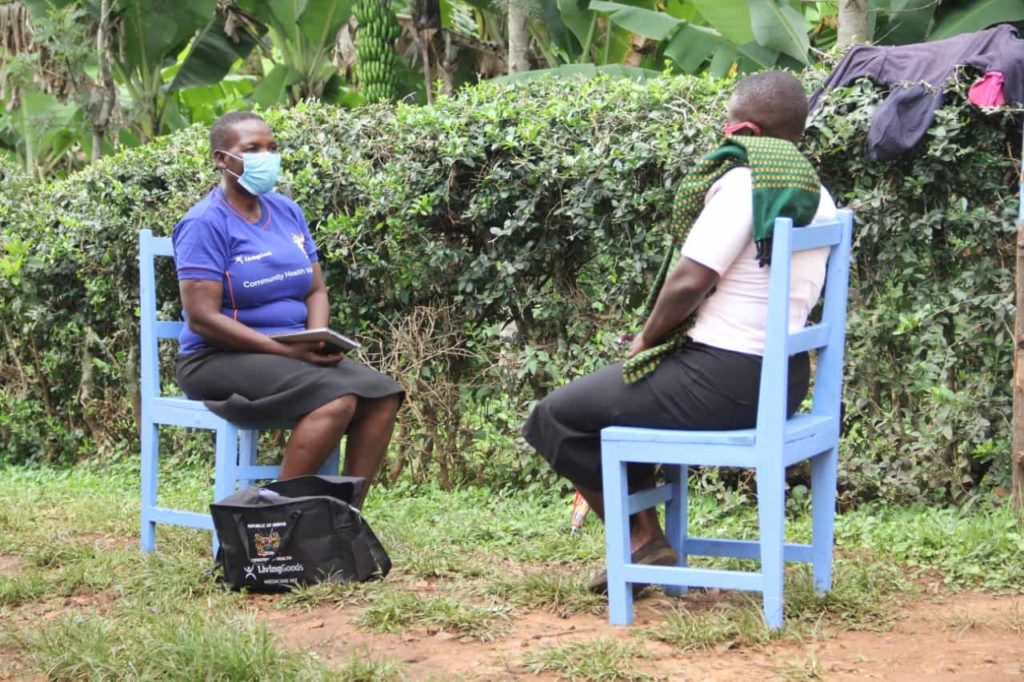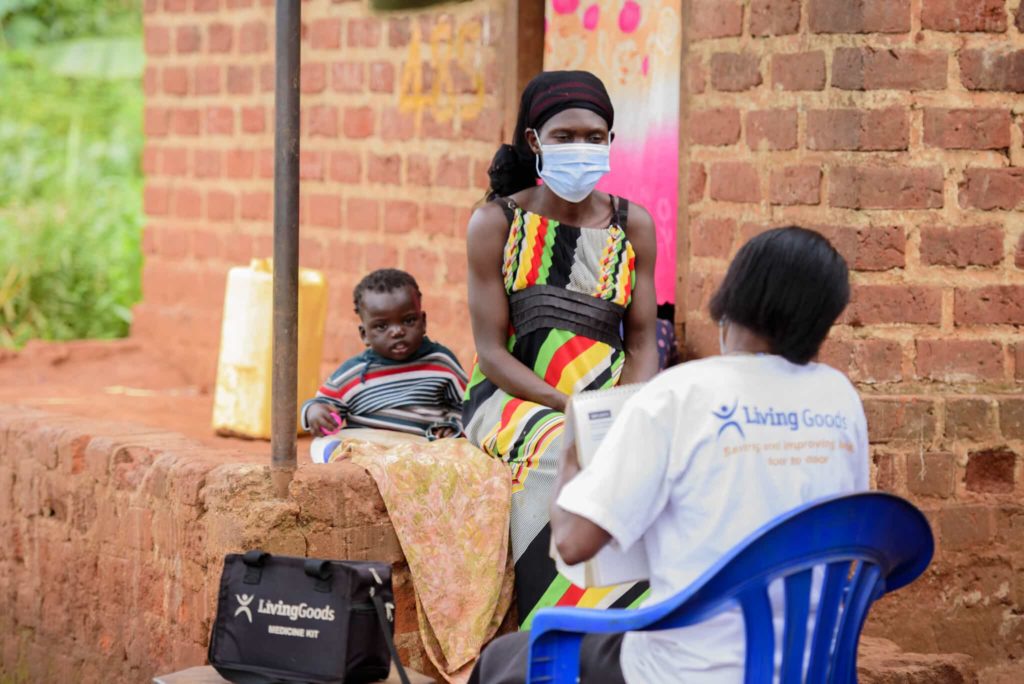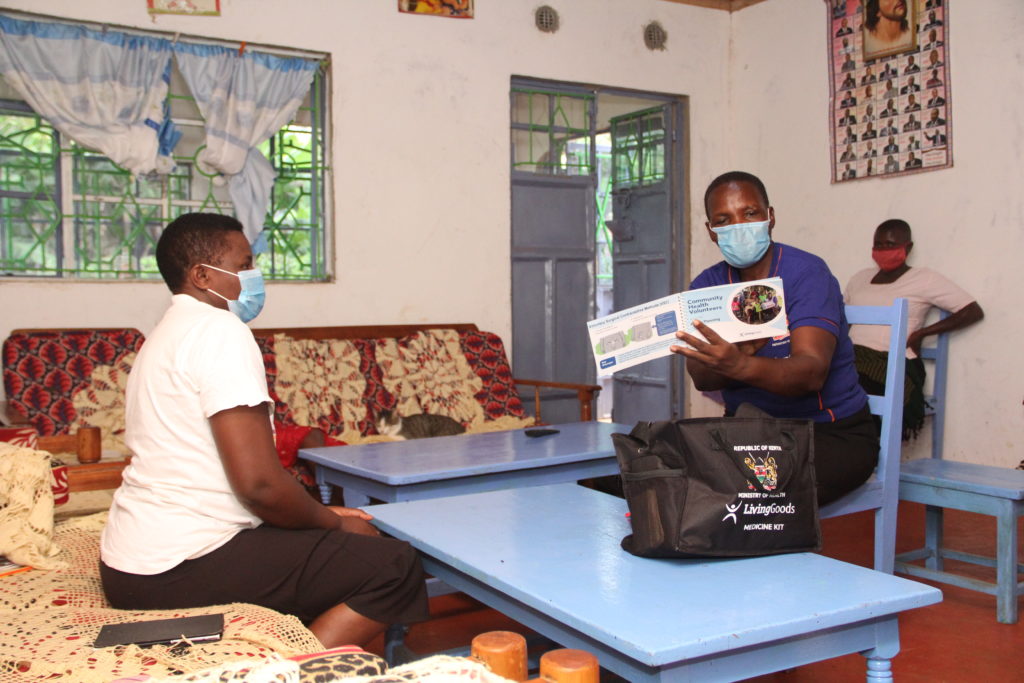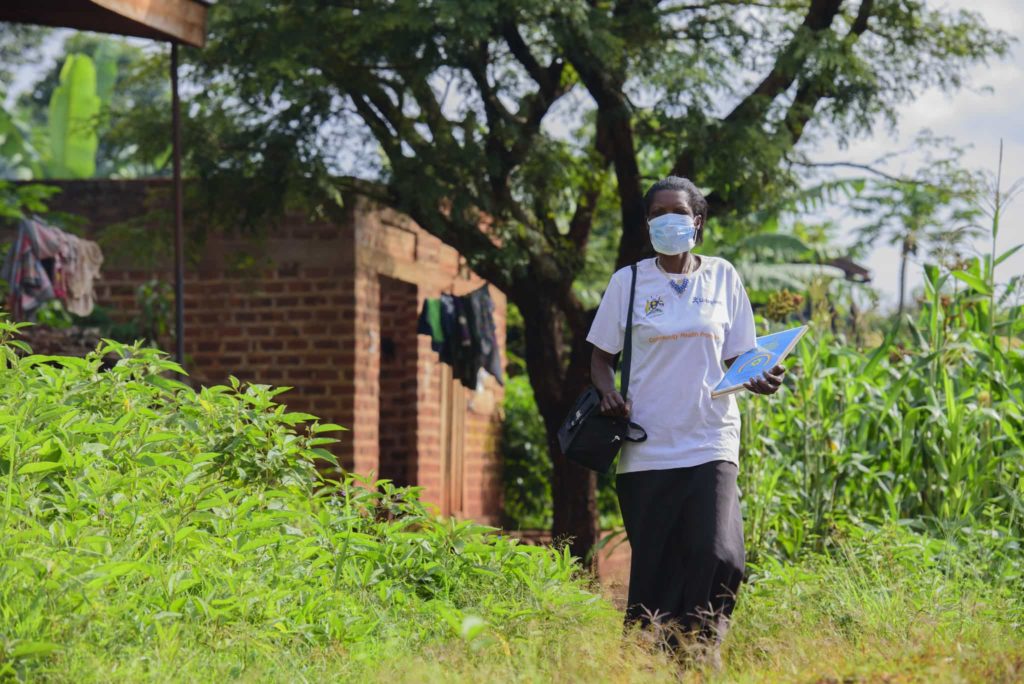A Closer Look at Community Health and Family Planning in Action
Living Goods Kenya and Living Goods Uganda

With its global office in Nairobi, Kenya, Living Goods aims to save lives at scale by supporting digitally empowered community health workers. The organization works with governments and partners to leverage smart mobile technology, rigorously strengthen performance, and relentlessly innovate to cost-effectively deliver high-quality, impactful health services. The Knowledge SUCCESS East African team engaged its partners at Living Goods East Africa (Kenya and Uganda) for an in-depth discussion on their community health strategy for implementing programs and how innovations are essential towards enhancing global development.
Q: Why is community health important in the health structure?
Dr. Kezia K’Oduol, Director of Health, Living Goods Kenya: Community health is an effective way of bringing health services to people where they live and is necessary for improving health indicator trends. Effective community health programs have increased universal health coverage (UHC) and contributed to the reduction of maternal, neonatal and under-five (U5) morbidity and mortality. Furthermore, Community health focuses on addressing health needs at the household level through promotive, protective, preventive, curative, rehabilitative and palliative approaches. The very things we strive for and want to see in our health systems such as equity, community ownership, social accountability, and effective linkages with health facilities are all key principles of community health, making it a critical part of the health structure.
Clara Kakai, Communications Manager at Living Good Kenya: We approach community health with a holistic system strengthening perspective when either implementing programs or advising the government on community health.
Q: What is the Living Goods approach/strategy to community health and why is it essential?
Clara Kakai: We use data-driven performance management, incentive systems, regular in-service training, and supportive supervision to help governments ensure there are digitally empowered, equipped, supervised and compensated community health workers (CHWs) who can deliver high-quality primary health care services. Beyond CHWs, Living Goods is also increasingly involved in efforts to strengthen local health systems, including advocating for increased investments in community health systems and integrating best practices into policies and practice.
Q: Living Goods is known for driving and embracing innovations. What innovations are you scaling up or implementing in the field of reproductive health and family planning currently in East Africa?
Allan Eyapu, Senior Field Operations Manager, Living Goods Uganda: To help women plan and space their pregnancies, the CHWs we support have started providing comprehensive family planning education and contraceptives. This started as a pilot experiment in two districts in Uganda in 2018, but has been so successful we’ve expanded it in many districts across the country and have started piloting it out in our Kenya operations.
Through these efforts, women of reproductive age are counseled and provided with the opportunity to access a broad range of contraceptives, including pills and condoms, and can also be referred for longer-term methods. ‘In 2019, we introduced CHW-led family planning services in Kenya through a quasi-experimental study intended to generate evidence to inform policy on scaling-up community-based distribution of DMPA-SC. The pilot was due to continue through September 2020 but was suspended due to government restrictions in response to the COVID pandemic. We are committed to resuming testing of this approach in Kenya as soon as it is safe to do so’.
Q: How do you leverage technology and CHWs to deliver voluntary family planning services to community members?
Dr. Kezia K’Oduol, Director of Health, Living Goods Kenya: CHWs are equipped with a phone and our Smart Health app, which has carefully designed workflows that standardize client counselling, assessment, and administration protocols for family planning services. This enables CHWs to facilitate health education sessions, register women of reproductive age taking up or switching family planning methods, determine their eligibility for family planning, recommend an appropriate method and provide follow-up services. The mobile app sends alerts and reminders for follow up visits while supporting CHWs adherence to guidelines and protocols as they provide quality voluntary family planning services.
In addition, the application also supports training and provides supervisors real-time performance data for each CHW through analytics dashboards, which support improved monitoring and drive better performance—and ultimately, health impact. All the data generated through these digital health tools is shared with the government and is used to inform decisions for CHW programs at every level.
Allan Eyapu: Of note, one of the key efforts we’ve tested and are now widely rolling out in Uganda is the community-based distribution and administration of the DMPA-SC (Sayana Press) injectable, which provides women with 3-months of protection, putting more power into women’s hands about their reproductive choices. Given the worrisome rise in unplanned pregnancies during COVID-19, due to challenges related to accessing facilities, we are now piloting a test of DMPA-SC self-injection, which would allow women to administer their own refills of this contraceptive method.

Perspectives of Community Health Volunteers
Knowledge SUCCESS East Africa sought to understand the role of Community Health Volunteers (CHVs) in providing FP/RH care and how integral they are to strengthening the community health strategy at the grass roots.
Ann: I’m Ann Nyaleso, a 53-year-old mother of two, a farmer and a government CHV in my hometown in Kisii County, Kenya. I was previously employed and trained in accountancy at the government postal service where I worked for my entire career until I was laid off in 2009. As a CHV, my work mainly involves supporting pregnant mothers and helping to keep children under five years healthy. I support over 100 families.

Anne Nyaleso attending a family planning client. (Photo: Living Goods)
I had a friend in a neighboring community who was a CHV. I admired the things she did and how knowledgeable she was about health issues. The stories she shared really resonated with me because I saw the same problems in my community and wanted to replicate the positive impact she was making in hers. When government came to recruit CHVs in my area, I signed up and was selected. I was not offered any incentives by government, but I still chose to contribute by volunteering my time to serve my community.
I wake up at round 5 AM, work on my farm and attend to any household chores for about three hours. Once I’m ready to visit my clients, I check my smartphone, which I received when I began working with Living Goods. The phone has an m-Health app known as Smart Health app , which provides me with a task list for the day that helps me to prioritize my visits and ensure I deal with urgent matters first. I spend a few hours visiting clients which involves assessing sick children and treating or referring cases of malaria, pneumonia, diarrhea, and malnutrition as necessary. I also provide continuous care for expectant mothers and educate them on newborn care which includes counselling and referral services on family planning and immunization. I do this at least thrice a week spending anything from 5 to 20 minutes per client depending on the needs and services I’m providing. Once I finish my visits I then go about my personal business for the rest of the day.
The proudest moments for me result from changing people’s mindsets or behaviors around health issues. I once visited a home where a child had been suffering from diarrhea for a few days and the child’s mother believed that this was just a normal part of teething – a pervasive belief in the area. I assessed the child and although the mother was initially hesitant, I educated and persuaded her to allow me to treat the child. When I did a follow-up visit the next day, the diarrhea had stopped, and the mother was very happy that her baby was now well and more active. She became a champion to help bust the myth and encourage other mothers to not ignore persistent diarrhea in young babies, even when they are teething. This has helped to save many young lives through timely treatment.
I had a client a few years ago, a young woman who approached me seeking a long-term FP method. I counselled and referred her to a health facility but unfortunately the method she received presented severe side-effects for her which included heavy menses. This caused conflict between her and her husband and eventual separation as the decision had not been reached jointly. She blamed me for this and despite my best efforts I was never able to reach her and offer her follow-up FP counseling services and a referral back to the facility. I felt badly that I couldn’t help resolve this unintended outcome.
Some clients desire to take on modern family planning but worry that their partners may not approve. So where appropriate, I always arrange to include both partners to allow them to make a joint decision about their FP choices based on their needs. This inclusive approach is often effective and allows men to take more responsibility for FP decisions. However, in cases when male partners are not very receptive, I involve my supervisor and we arrange to speak to them together. This usually works but sometimes it takes several visits and sustained education to win them over.
For individuals for whom the household visit may not be the ideal place to access FP counseling and referral services, I ensure they can reach me and many even visit me at my home where I can freely educate them and provide access to the knowledge they need to make informed FP decisions that fit their circumstances.
Sarah: My name is Sarah Nakaggwa. I am 52 years old. I live in Buikwe district in Uganda and serve as the Woman Councilor for Njeru Municipality. I dropped out of school after senior two, when I lost my father who was paying my school fees. My dream was to study and become a nurse. I have six children, three of whom are nurses.

Living Goods—through the local council—came to my village recruiting people to train in community health. They were looking for people who are compassionate and have a servant heart. I offered myself and was selected after a rigorous exercise that included exams. I was so happy when I was chosen to undergo the training. Though I was not going to be a nurse with a cap, I was going to be a health worker! I have been supported by Living Goods since 2017 and my main motivation is to save lives, especially children’s. I was also excited to be trained in family planning, because I believe if I had had enough knowledge myself, I would have had fewer children. I have faced many challenges taking care of six children—paying school fees for them. The opportunity to be a community health volunteer (CHV) came at the opportune time, when I had just lost my husband. I have benefited a lot from this role because now I’m seen as a helpful person in my community, and have gained financially.
Before the COVID pandemic, I used to wake up before dawn to pray before preparing my home and leaving for the garden at 7:00 am. I would come back home at 11:00 to make lunch and start the door to door visits to my clients at 3:00 pm. With the pandemic, Living Goods now gives us airtime to call our clients instead of visiting everyone in their home. From when the lockdown started, they have been giving us free essential medicine for children, so parents bring their children to my home for treatment. It is easier to follow the COVID procedures this way. I however take the initiative to make follow up calls and visits to those who can’t come to my home, since I have PPE such as gloves, masks and sanitizer from Living Goods.
Since becoming a CHV, my proudest moment was when I was called about a mother who had had a home delivery but got a complication with the placenta. She was in a lot of pain. I took her to the hospital myself, and followed up to ensure that there was a doctor to attend to her. She and her child survived. I have a big challenge with mothers who we care for during pregnancy, but they refuse to go to health facilities when it’s time to deliver. They instead settle for traditional birth attendants. It is sad when this happens because some women die in the process. We need the government to put regulations in place for traditional birth attendants to avert deaths.
My worst experience has always been when women come to me for family planning options without disclosing to their husbands, who when they later find out point accusatory fingers at me. I take the confidentiality of my clients very seriously, but when a spouse of a client comes to me complaining about the decision of their partner to use any form of modern family planning option, I take the time to sit down with them, listen to their concerns, and then use the opportunity to educate them about family planning and how they can support their spouse. We always come to some sort of consensus and some even offer to come with their partners for refills. I thank Living Goods for ensuring that we can still offer affordable family planning options during the pandemic, because the demand is still there.




